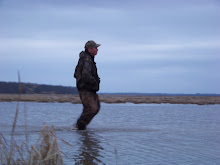"Shooter's Ear"
Sure enough, the audiologist who was manning the booth confirmed that my hearing was better in my left ear than my right. Not by much, according to medical standards apparently, but enough to register, and enough to have spurred me to stand on line for ten minutes awaiting my brief exam.
Before I could ask the audiologist why it was that my right ear was worse than my left, he said, “I’ll bet you shoot left-handed, don’t you?”
How did he know?
The audiologist knew because my right ear was the one that showed some hearing loss. He went on to explain what he called “shooter’s ear,” or asymmetric hearing loss with more damage being sustained by the off-handed ear. According to the audiologist, the ear closest to the gun stock is somewhat protected by the way the head is turned; likewise, the off-handed ear is actually closer to the end of the gun barrel, and so therefore absorbs more of the muzzle blast. To emphasize, he allowed as how he shoots right-handed and has some hearing loss in his left ear.
Having gained an understanding (and no small measure of relief) of the reason my right ear hasn’t been as effective as my left in the past few years, I walked around the exhibit hall and pondered how this self-induced affliction might actually serve as a benefit instead of a detriment. Before long, I imagined a few scenarios in which shooter’s ear could really come in handy.
For instance, let’s say you shoot right-handed and for years have refused to wear ear plugs in the duck blind and dove field. Chances are your left ear ain’t quite what it used to be. Now let’s say you’re taking a big, important client deer hunting for the weekend, but this big, important client possesses two undeniable characteristics: one, he’s never hunted deer before, and two, he’s one of these people who knows everything about everything, including deer hunting. You’re going to have to spend the entire weekend holed up with him in a shooting house, where there will be little to do but whisper to one another while you watch grass grow and wait for a deer to walk out in front of you. Here’s where your shooter’s ear pays off.
Being the conscientious host that you are, you’ll naturally climb up into the shooting house first to make sure it’s in good shape and to check for wasps. After you’ve spent a sufficient amount of time rustling around up there, you call down to your client for him to climb on up. As he’s climbing up the ladder, you plop yourself down in the chair on the right, thus positioning him on your left – right next to your shooter’s ear. He can talk all he wants and your muffled hearing on that side will ensure that you’ll pick up only about a third of it. Just be sure to nod a lot if you want to keep his business.
Now let’s say you’re walking through successional habitat under the towering canopy of a longleaf plantation in leisurely pursuit of bobwhite quail. If you’re like me, you’re not much of a wing shot, but all your friends shoot like they’re directly descended from Lord Ripon himself. And if you’re like me, your friends are never engaged in the act of shooting a quail at the same time you are, which means they never miss an opportunity to witness you missing an opportunity.
Since much of bird hunting is verbal as well as visual (“Rog! Bird on your lef--- Nevermind.”), you can employ your shooter’s ear to mask your inferior wingshooting. Simply take up a position with your bad ear to your shooting partner as you stalk behind the pointers. Any time a flushing bird presents an easy shot before anyone else has time to call out to you, fire away.
But, any time a quail flushes and provides a shot you’re not very good at making, and one of your buddies calls out to you, “Bird! Low and left!” you can opt not to take the shot, thus avoiding the degradation of missing. After the quail sails back to the ground and lights somewhere in the thicket beyond the pointers, you can turn to your pals and give a frustrated grimace while you tap your index finger against your shooter’s ear and shake your head. They’ll just assume you didn’t hear them in time to shoulder your double gun, and move on to the next point.
As I was exiting the exhibit hall after my hearing test, I spied a fellow leaning against the wall near the door catching what-for from his wife. I could tell from her facial expressions and her body language and the way she was moving her head back and forth that he was in serious trouble. Yet, as he stood there being admonished in front of a room full of people, he looked as aloof as a napping dog, without a care in the world. I looked at him, then glanced at his wife on his right, and then looked back at him. Then it dawned on me. As I passed him I muttered, “Lefty, huh?” He just looked at me and winked.
(c) Roger Guilian 2010


<< Home